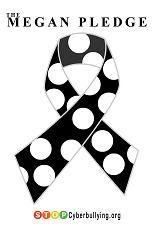It happens to kids at all ages, all abilities, all over. The snickering. A little knot of kids glances at you, lean together, and it begins. You just know there is something about you that they think is weird, odd, ugly, funny. What really gets you is that they have their own quirks, and would be just as hurt if the snickering was about them.
Some kids get more snickering than others. I remember the snickering myself, the tall fat girl who knew too much. The curvebreaker. The weird kid. It can be very hard to see it so obviously aimed at Joey, to hear what the snickers are: Weird kid. Retard. Fat. Stupid.
Most of the snickering is a passing thing. Like driving along the road, I hardly even notice it anymore, registering as ignorant person is here-snickering-gone-forgotten. The effort needed to interrupt and educate would be seen only as further annoyance, the lesson lost on those who couldn't care less what pain they cause. The weird kid's mother is saying something, but it sounds like Charlie Brown's teacher: "wa wa wawa waaaaa."
Yet they stick like little pins, even in good times. Especially in good times.
A child, older, at the Beach Party. Joey said hello. The kid responded off-handedly, then mumbles something to a friend. Did I blanche at hearing those terrible snickers fall from the lips of a child Joey bothered to speak to, called by name? The friend says, "hey, that's the kid's mother!" and the kid turns his face to me. There is no point in saying anything, the child might be eleven, he knows his words are not something he would want "that kid" 's mother to overhear. I restrain myself to simply glaring at him. He stares back, he doesn't know what to say or do. I pass him to go say something about a picture Joey has drawn. Hint, kid: if you wouldn't want the kid's mother to hear what you are saying, you should be thinking hard about why are are saying it. Or thinking it. Or how you would like it if someone said that about you to someone else. Especially in front of your mother.
Two boys, nine? ten? one might be eleven? playing at the pool. The youngest says hello to Joey. Joey is absorbed in his own activity of shoveling water and barely responds. They move away from him- but if I can hear it, Joey can hear it. Weird kid from school, that's what he is to them. They play a sort of odd play with him-shun him pattern most the afternoon. I'm not sure he notices, he is busy with his own play, and seems unperturbed when they swim away from him after addressing him. He has a friend to play with, a girl with Downs, the boys refer to them as the "retarded kids". I probably turn purple. If I get up and fuss at them, would they hear me? Would they care? Would their parents simply back them up? I know these boys, I have seen them at the pool before and the playground, and I know the answers to these questions. Consequently, I save my breath. There are plenty of other kids for Joey to play with, he steers clear of them, he knows.
These aren't run-of-the-mill child-jibes. This is serious. My child is going to have to go through his life dealing with these people, because there are people who believe it is OK to make fun of people with disabilities. They think people like my son are of less value than themselves, or think so little of themselves that they want to devalue Joey in an attempt to inflate their own. People believe that to be disabled is to be broken, to be less, to no longer be worthy of being human, or even having the right to live. People see no value in including those with different abilities and challenges, fail to learn the lessons of understanding, acceptance, faith, perseverance, strength, and hope that my child has to offer- in addition to the lessons he offers in reading, writing, and arithmetic, those all-important school subjects. To so many, Joey is a waste of time, a waste of money, a waste of resources, a waste of breath. Those many miss so much, lost in their ignorance, spreading it to their friends, their neighbors, their children. They don't understand that it is wrong, because they have been taught by our society that it is OK to snicker. Everyone snickers. Everyone gets snickered at. We all learn to just cope with it- ignore them, or worry about them, or poo-poo them, or whatever. What's the big deal?
Those standing in similar shoes as mine know exactly what the big deal is, as we struggle to teach our children to cope, as they don't just "pick it up" and are at a loss to defend themselves. The cry of "get thicker skin!" is such a sad one, a cry of of despair, one that shows complete ignorance of where I stand or the challenges my child faces. Trying to communicate the problem sounds incredible to those who are ignorant of it. We all get teased, it's what kids do, learn to deal, all kids have to, its a phase, they'll get over it. It is like trying to explain the difference between a tantrum and meltdown. The difference between a picky eater and a neophobe. The difference between a child wanting a toy to hold and a child needing a toy to hold. The limitations of human language become frustrating, but waxing mythic doesn't help. Most people don't want to think about things on the slant, don't want to deal with narrative metaphor. We seem to think it a deficit when autistic people only think concretely, but when non-autistic people can't move beyond the concrete, it's our problem that we can't communicate.
Then they snicker about how stupid we are. How's that for weird?
Subscribe to:
Post Comments (Atom)




















4 comments:
Ah yes, rigidity of thought is not just reserved for those who are autistic. Far too many in the NT world have shown us this trait, time and time again.
I sense that this is already happening with/to Hallie (who is about to turn five this week). Mean kids abound. Sharon (Hallie's other mom) and I are both extremely concerned about what might happen to Hallie once she enters elementary school. We're so concerned that we are considering whether we can swing (and get her into) a Quaker school, where this sort of behavior might not be so readily tolerated and excused. Do you think this might help make a difference?
Honestly abby, schools are like churches that way- it depends on the school, and the people in the school. The best thing to do is go talk with them, get to know them, let them get to know you and Hallie, and see what you think about it then.
...sigh...We live this life all too often. At one point, I began speaking directly to the child's parents (when available), but found that the parents were probably more ignorant than the children. You know that saying...the apple doesn't fall..
We have been teaching our sons that EVERYONE has something that challenges them...no matter who they are. We also avoid places that have been over-whelmingly negative in the past.
Post a Comment